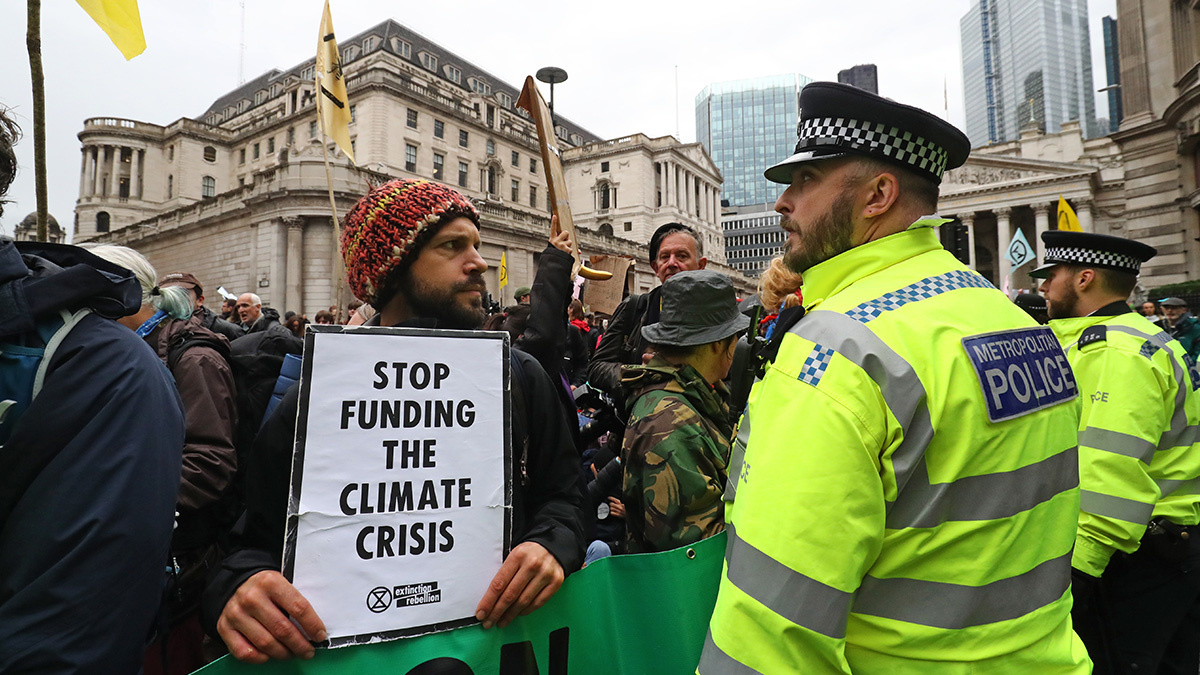

Protesters block the road outside Mansion House in London during an XR climate change protest. Gareth Fuller / PA Images via Getty Images
One week into Extinction Rebellion‘s planned two weeks of International Rebellion to demand action on the climate crisis, the London police have banned the group from the city.
The Metropolitan Police made the announcement Monday evening, and immediately began to clear the protest encampments from Trafalgar Square, which had previously been designated as a legitimate protest area, according to The Guardian.
“Any assembly linked to the Extinction Rebellion ‘Autumn Uprising’…must now cease their protest(s) within London (Metropolitan Police Service, and City of London areas) by 2100hrs [on Monday] 14th October 2019,” the police announcement said.
Protestors were given 30 minutes warning to leave Trafalgar Square Monday night, 71-year-old demonstrator Pam Williams told BBC News.
Extinction Rebellion said they would “let Trafalgar Square go,” but a few activists like Williams decided to glue themselves to the ground and face arrest.
“I feel possibly that they’ve been approached by people we’ve upset today, maybe the finance sector or the banking sector,” Williams said, referring to a protest earlier Monday that blocked the crosswalk outside the Bank of England. “I’m refusing to leave and I’ve glued myself to the ground.”
Among those arrested in Trafalgar Square Monday night was Green Party Member of European Parliament Ellie Chowns.
“The rules have been changed,” Chowns said, according to BBC News. “No longer is any space in London allowable for peaceful democratic protest. This is intolerable.”
The police issued the ban under Section 14 of the Public Order Act of 1986, which gives police the authority to impose restrictions such as place, duration and number of participants on any assembly that “may result in serious public disorder,” property damage or intimidation.
But Network for Police Monitoring coordinator Kevin Blowe told The Guardian that the ban did not follow due process, because such bans are supposed to be made by the home secretary. He also explained why he thought the ban could face a challenge in court:
“Our reading of it is that the section 14 powers are supposed to be used with caution because people still have a right to protest and potentially this is unlawful, and there is no other way to put it. Take a look at what section 14 says: it’s about restricting a number of people for a particular duration of time. My feeling is that this has to be open to some form of potential legal challenge.”
As of Monday, London police had arrested 1,445 people and charged 76 in relation to the ongoing extinction rebellion protests.
The demonstrators are demanding that the UK government declare a climate emergency, halt biodiversity loss and achieve net zero greenhouse gas emissions by 2025 and convene a Citizens’ Assembly to oversee these changes.
“The Climate and Ecological Emergency isn’t going away and we remain resolute in facing it,” the group wrote in a response to the police ban. “We urge the Government and the authorities to join us in doing the same. We cannot do it alone. This is bigger than all of us.”

 233k
233k  41k
41k  Subscribe
Subscribe 